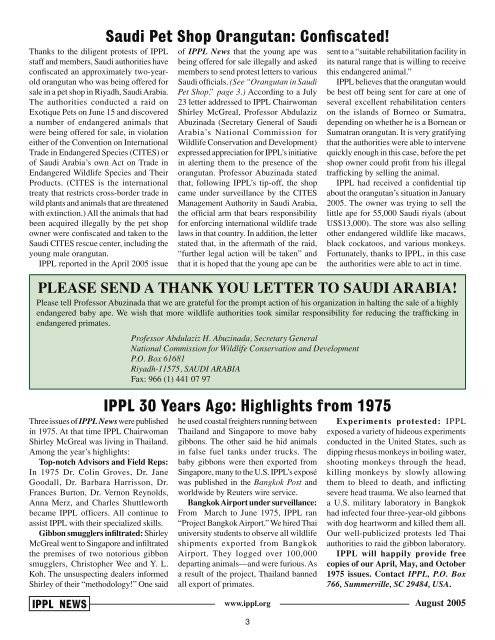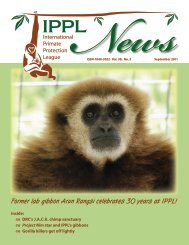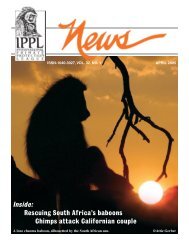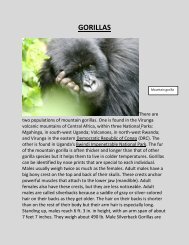IPPL News Aug05.indd - International Primate Protection League
IPPL News Aug05.indd - International Primate Protection League
IPPL News Aug05.indd - International Primate Protection League
You also want an ePaper? Increase the reach of your titles
YUMPU automatically turns print PDFs into web optimized ePapers that Google loves.
Thanks to the diligent protests of <strong>IPPL</strong><br />
staff and members, Saudi authorities have<br />
confiscated an approximately two-yearold<br />
orangutan who was being offered for<br />
sale in a pet shop in Riyadh, Saudi Arabia.<br />
The authorities conducted a raid on<br />
Exotique Pets on June 15 and discovered<br />
a number of endangered animals that<br />
were being offered for sale, in violation<br />
either of the Convention on <strong>International</strong><br />
Trade in Endangered Species (CITES) or<br />
of Saudi Arabia’s own Act on Trade in<br />
Endangered Wildlife Species and Their<br />
Products. (CITES is the international<br />
treaty that restricts cross-border trade in<br />
wild plants and animals that are threatened<br />
with extinction.) All the animals that had<br />
been acquired illegally by the pet shop<br />
owner were confiscated and taken to the<br />
Saudi CITES rescue center, including the<br />
young male orangutan.<br />
<strong>IPPL</strong> reported in the April 2005 issue<br />
Three issues of <strong>IPPL</strong> <strong>News</strong> were published<br />
in 1975. At that time <strong>IPPL</strong> Chairwoman<br />
Shirley McGreal was living in Thailand.<br />
Among the year’s highlights:<br />
Top-notch Advisors and Field Reps:<br />
In 1975 Dr. Colin Groves, Dr. Jane<br />
Goodall, Dr. Barbara Harrisson, Dr.<br />
Frances Burton, Dr. Vernon Reynolds,<br />
Anna Merz, and Charles Shuttleworth<br />
became <strong>IPPL</strong> officers. All continue to<br />
assist <strong>IPPL</strong> with their specialized skills.<br />
Gibbon smugglers infiltrated: Shirley<br />
McGreal went to Singapore and infiltrated<br />
the premises of two notorious gibbon<br />
smugglers, Christopher Wee and Y. L.<br />
Koh. The unsuspecting dealers informed<br />
Shirley of their “methodology!” One said<br />
Saudi Pet Shop Orangutan: Confiscated!<br />
of <strong>IPPL</strong> <strong>News</strong> that the young ape was<br />
being offered for sale illegally and asked<br />
members to send protest letters to various<br />
Saudi officials. (See “Orangutan in Saudi<br />
Pet Shop,” page 3.) According to a July<br />
23 letter addressed to <strong>IPPL</strong> Chairwoman<br />
Shirley McGreal, Professor Abdulaziz<br />
Abuzinada (Secretary General of Saudi<br />
Arabia’s National Commission for<br />
Wildlife Conservation and Development)<br />
expressed appreciation for <strong>IPPL</strong>’s initiative<br />
in alerting them to the presence of the<br />
orangutan. Professor Abuzinada stated<br />
that, following <strong>IPPL</strong>’s tip-off, the shop<br />
came under surveillance by the CITES<br />
Management Authority in Saudi Arabia,<br />
the official arm that bears responsibility<br />
for enforcing international wildlife trade<br />
laws in that country. In addition, the letter<br />
stated that, in the aftermath of the raid,<br />
“further legal action will be taken” and<br />
that it is hoped that the young ape can be<br />
<strong>IPPL</strong> 30 Years Ago: Highlights from 1975<br />
he used coastal freighters running between<br />
Thailand and Singapore to move baby<br />
gibbons. The other said he hid animals<br />
in false fuel tanks under trucks. The<br />
baby gibbons were then exported from<br />
Singapore, many to the U.S. <strong>IPPL</strong>’s exposé<br />
was published in the Bangkok Post and<br />
worldwide by Reuters wire service.<br />
Bangkok Airport under surveillance:<br />
From March to June 1975, <strong>IPPL</strong> ran<br />
“Project Bangkok Airport.” We hired Thai<br />
university students to observe all wildlife<br />
shipments exported from Bangkok<br />
Airport. They logged over 100,000<br />
departing animals—and were furious. As<br />
a result of the project, Thailand banned<br />
all export of primates.<br />
——————————————————————— <strong>IPPL</strong> NEWS<br />
www.ippl.org ———————————————— August 2005<br />
3<br />
sent to a “suitable rehabilitation facility in<br />
its natural range that is willing to receive<br />
this endangered animal.”<br />
<strong>IPPL</strong> believes that the orangutan would<br />
be best off being sent for care at one of<br />
several excellent rehabilitation centers<br />
on the islands of Borneo or Sumatra,<br />
depending on whether he is a Bornean or<br />
Sumatran orangutan. It is very gratifying<br />
that the authorities were able to intervene<br />
quickly enough in this case, before the pet<br />
shop owner could profit from his illegal<br />
trafficking by selling the animal.<br />
<strong>IPPL</strong> had received a confidential tip<br />
about the orangutan’s situation in January<br />
2005. The owner was trying to sell the<br />
little ape for 55,000 Saudi riyals (about<br />
US$13,000). The store was also selling<br />
other endangered wildlife like macaws,<br />
black cockatoos, and various monkeys.<br />
Fortunately, thanks to <strong>IPPL</strong>, in this case<br />
the authorities were able to act in time.<br />
PLEASE SEND A THANK YOU LETTER TO SAUDI ARABIA!<br />
Please tell Professor Abuzinada that we are grateful for the prompt action of his organization in halting the sale of a highly<br />
endangered baby ape. We wish that more wildlife authorities took similar responsibility for reducing the trafficking in<br />
endangered primates.<br />
Professor Abdulaziz H. Abuzinada, Secretary General<br />
National Commission for Wildlife Conservation and Development<br />
P.O. Box 61681<br />
Riyadh-11575, SAUDI ARABIA<br />
Fax: 966 (1) 441 07 97<br />
Experiments protested: <strong>IPPL</strong><br />
exposed a variety of hideous experiments<br />
conducted in the United States, such as<br />
dipping rhesus monkeys in boiling water,<br />
shooting monkeys through the head,<br />
killing monkeys by slowly allowing<br />
them to bleed to death, and inflicting<br />
severe head trauma. We also learned that<br />
a U.S. military laboratory in Bangkok<br />
had infected four three-year-old gibbons<br />
with dog heartworm and killed them all.<br />
Our well-publicized protests led Thai<br />
authorities to raid the gibbon laboratory.<br />
<strong>IPPL</strong> will happily provide free<br />
copies of our April, May, and October<br />
1975 issues. Contact <strong>IPPL</strong>, P.O. Box<br />
766, Summerville, SC 29484, USA.










